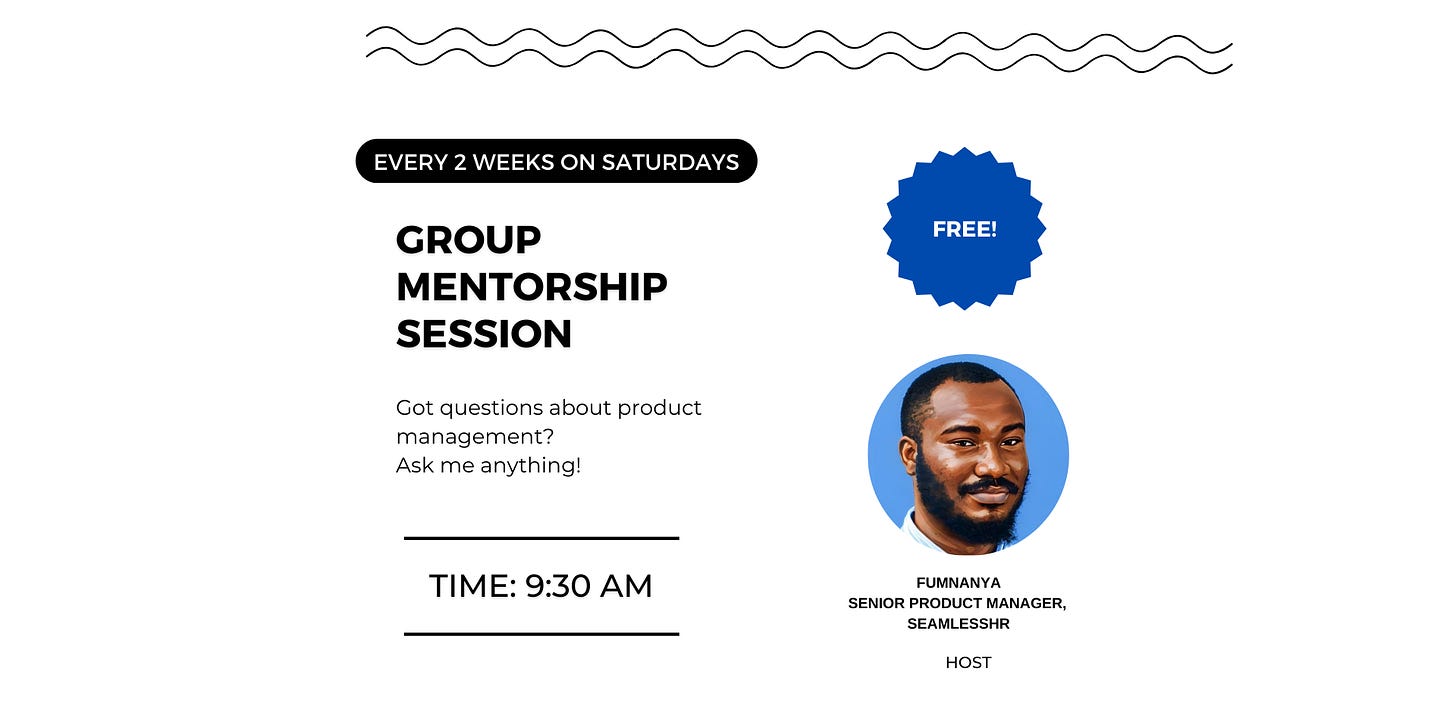Navigating the Product Career Ladder
Focus on these three Key Areas
Hi there!
Are you a product manager who feels lost and overwhelmed?
Do you constantly face challenges that make you feel frustrated and isolated in your role?
Are you eager to elevate your career and achieve new heights of success?
If you answered yes to any of these questions, you're not alone. Many product managers face these same challenges. But there's no need to struggle on your own.
I'm here to offer you the guidance and support you need to overcome these obstacles and help you achieve your product career goals.
What I offer is dedicated one-hour mentorship sessions to product managers, both aspiring and current. During our sessions, we'll discuss your product goals, challenges, and opportunities. I'll share my insights and advice, and I'll help you to develop your product management skills.
If you are interested in being a mentee, you can click here to learn more.
ICYMI: Here is a free product wiki I curated to help you in your product journey. Do go through it and I would love to hear your feedback!
The journey up the product management career ladder is an exciting yet challenging endeavour. Many product managers often find themselves seeking guidance on the crucial aspects that can propel them forward.
Drawing from discussions in our free group mentorship sessions, let's delve into three key focal points for product managers aiming to climb the career ladder successfully.
Execution Excellence: Turning Visions into Action
At the heart of a successful product manager's skill set lies the ability to execute effectively. Execution is not merely about completing tasks; it's about ensuring that tasks are accomplished with precision and adherence to designated timelines. When a deadline is set, meeting it becomes of paramount importance.
When executing, positive outcomes should consistently outweigh negative results. Execution serves as the driving force that transforms strategies and visions into tangible results. It bridges the gap between ideation and realization, empowering product managers to deliver value consistently.
Here are some specific examples of how effective execution manifests in product management:
Delivering on time and within budget: This requires careful planning, resource allocation, and risk management.
Meeting or exceeding quality standards: This involves establishing clear quality criteria and implementing rigorous testing procedures.
Achieving customer satisfaction: This necessitates gathering and responding to customer feedback, addressing pain points, and continuously improving the product experience.
Meeting business objectives: This demands aligning product development efforts with overall business goals and tracking key performance indicators.
When you master the art of execution, you can elevate your contributions from mere ideas to tangible successes, making a great impact on the products they shape and the organizations they serve.
More Strategic, Less Operational
Moving up the product career ladder entails a shift towards more strategic thinking and less operational involvement. In this shift, you start caring more about what favourable business or product outcome solving a particular problem will bring than pouring work into your sprints just because you want the developers to work on 'something'.
Also, this shift goes beyond crafting a product strategy; it encompasses deeper facets that contribute to a product manager's effectiveness.
These facets include:
Product Thinking: Unpacking the "Why”
Product thinking involves a profound understanding of the "Why" behind every product decision. It's about focusing on outcomes, gaining insights, and empowering both the team and the end-user. For instance, considering the Jobs to be Done (JTBD) framework allows product managers to align product features with the actual needs and motivations of users.
Creating New Opportunities: Beyond Maintaining, Innovating
Product managers should spend significant time exploring and creating new business opportunities rather than solely maintaining existing revenue streams. This involves proactive market research, identifying emerging trends, and anticipating user needs before they articulate them.
Effective Product Strategy: A Unified Vision
Crafting a product strategy is not just about creating a roadmap; it's about formulating a vision that resonates across the organization. A well-defined strategy should be clear, and actionable, and garner support from key stakeholders, fostering alignment and commitment.
Think more about the big picture
Strategic product managers need to be able to see the forest for the trees. They need to be able to understand how their product fits into the overall business strategy, and how it can be used to achieve long-term goals. This requires a deep understanding of the market, the competition, and the business itself.
Building Systems and Processes: Intentional Team Development
A strategic product manager goes beyond the immediate product tasks and focuses on building robust systems and processes. This involves establishing frameworks that enable the team to operate smoothly and achieve successful outcomes consistently.
Example: Feedback Mechanisms
Implementing structured feedback mechanisms ensures effective communication within the team. Whether through regular retrospectives or anonymous feedback channels, these systems provide insights for continuous improvement.
Example: Operational Guidelines
Defining team norms and operational guidelines sets the expectations for collaboration, decision-making, and problem-solving. This clarity contributes to a more efficient and harmonious working environment.
Additional Tips for Product Managers Climbing the Career Ladder:
Embrace Continuous Learning: Product management is constantly evolving, so it's crucial to stay up-to-date with the latest trends and technologies. Read industry publications, attend conferences, and take online courses to expand your knowledge base.
Build Strong Relationships: Networking with other product managers, industry experts, and potential mentors can provide valuable insights and support. Attend industry events, join online communities, and actively participate in discussions to expand your network.
Seek Feedback and Mentorship: Regularly seek feedback from your manager, peers, and mentors to identify areas for improvement and gain valuable guidance. A mentor can provide personalized advice and support as you navigate your career path.
Showcase Your Work: Share your accomplishments and contributions with your manager, team members, and broader organization. Create a portfolio of your work to highlight your skills and expertise.
Communicate Effectively: Clear and concise communication is essential for product managers. Practice your communication skills, both written and verbal, to effectively convey your ideas, strategies, and progress.
Remember, climbing the product career ladder takes time, dedication, and a willingness to learn and grow. By focusing on these key areas and continuously striving to improve, you can achieve your career goals and make a significant impact in the product management field.
Join the Conversation
These thoughts are precisely the kind we explore in our free group mentorship sessions.
Whether you're just starting your product management journey or you're a seasoned professional, these sessions offer a unique opportunity. They provide actionable insights, practical advice, and a platform for rich discussions that can supercharge your role and your career.
We will be having a session by 9:30 am today.
Here is the link to register and join: https://lu.ma/75lh9kzi
See you there!
If you enjoyed reading this newsletter and would like to receive more in the future, do subscribe to The Product Gist. Thank you.
If you find the newsletter valuable, do share it with others so they can enjoy the benefits.



